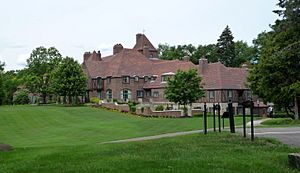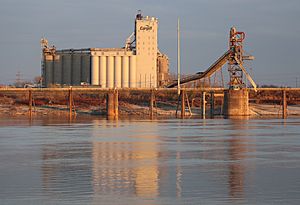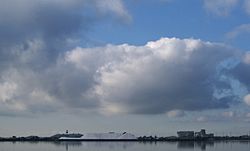Cargill facts for kids
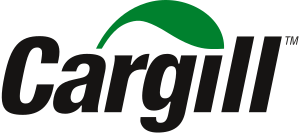 |
|
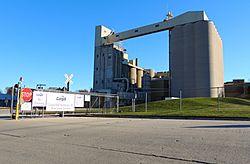
Cargill Malt in Sheboygan, Wisconsin
|
|
| Private | |
| Industry | Conglomerate |
| Founded | 1865 |
| Founder | William Wallace Cargill |
| Headquarters | Minnetonka, Minnesota, U.S. |
|
Area served
|
Worldwide |
|
Key people
|
Dave MacLennan (Chairman and CEO) |
| Products | Agricultural services, crop and livestock, food, health and pharmaceutical, industrial & financial risk management, raw materials |
| Revenue | |
|
Operating income
|
|
| Total assets | |
| Owner | Cargill family (88%) |
|
Number of employees
|
166,000 (2019) |
Cargill, Incorporated is a huge American company that deals with food and agriculture around the world. It is based in Minnetonka, Minnesota. Founded in 1865, it is the largest privately owned company in the United States. This means its shares are not traded on a stock market.
Cargill does many things. It buys, sells, and moves grains and other farm products like palm oil. It also trades in energy, steel, and transportation. The company raises livestock and makes animal feed. It produces food ingredients such as starch, glucose syrup, and vegetable oils for processed foods. Cargill also has a part of its business that helps manage money risks in the markets where goods are bought and sold.
In 2018, Cargill made over $114 billion in sales. It has more than 166,000 employees in 66 countries. Cargill is responsible for a quarter of all grain exports from the United States. It also supplies about 22% of the meat in the US market. The company is the biggest producer of poultry in Thailand. All the eggs used in US McDonald's restaurants come through Cargill's facilities.
Cargill is still a family-owned business. The descendants of the founder, from the Cargill and MacMillan families, own most of the company.
Contents
History of Cargill
Cargill has a long history, starting in the 1800s.
How it Started (19th Century)
Cargill began in 1865 when William Wallace Cargill bought a grain storage building in Conover, Iowa. A year later, his brother Sam joined him, and they formed W. W. Cargill and Brother. They built more grain storage places and opened a lumberyard. In 1875, Cargill moved its main office to La Crosse, Wisconsin. This location was good because it was near important rivers and train lines.
In 1887, Sam Cargill moved to Minneapolis, which was becoming a big grain center. Later, in 1898, John H. MacMillan, Sr., and his brother Daniel started working for the company. John MacMillan married William Cargill's oldest daughter, Edna.
Growing Through Challenges (20th Century)
When Sam Cargill died in 1903, William Cargill became the only owner of the La Crosse office. John MacMillan became the general manager in Minneapolis. William Cargill died in 1909, which caused money problems for the company. John MacMillan worked hard to fix these issues. Today's owners are related to John MacMillan's sons and William Cargill's youngest brother-in-law.
John MacMillan led the company until 1936. Under his leadership, Cargill grew a lot. It opened offices in New York in 1923 and expanded internationally to Canada, Europe, and Latin America. During this time, Cargill had both very good profits and also big money shortages.
One challenge was the debt left after William W. Cargill's death. The company managed to pay off its debts by 1915, thanks to high grain prices during World War I. As the war continued, Cargill made a lot of money, but some people criticized them for making too much profit from the war.
Cargill also had disagreements with the Chicago Board of Trade, a place where grains are traded. This started in 1934 when the Board did not want Cargill to be a member. The US government stepped in and made the Board accept Cargill. In 1938, the Chicago Board suspended Cargill from trading, saying the company tried to control the corn market. Cargill refused to rejoin for several years, trading through other people instead.
During World War II, Cargill continued to grow. It stored and moved grain and even built ships for the United States Navy. In 1962, Cargill rejoined the Chicago Board of Trade.
In 1960, Erwin Kelm became the first CEO who was not part of the Cargill family. He helped the company expand into making products like flour, starches, and syrups. Cargill also developed a smart system to keep track of market information for its trading, processing, and shipping businesses. Before email, the company used its own special telex system for talking to each other.
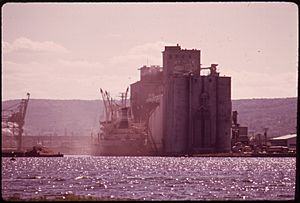
In the 1970s, the Soviet Union started buying a lot of grain, which made demand very high, and Cargill benefited greatly. Cargill had already made a big wheat deal with the USSR in 1963. When Whitney MacMillan took over the company in 1976, its sales were almost $30 billion.
In 1979, Cargill started its meat-processing business by buying MBPXL, which later became known as Cargill Meat Solutions. This part of the company grew to include turkey, food service, and food distribution.
By the early 1990s, some family members who owned shares in Cargill were not happy because they were not getting much money back from their shares. They wanted the company to become public so they could sell their shares easily. Cargill responded by creating a plan for employees to own shares. The company also changed its board of directors to include fewer family members and more independent people.
In the late 1990s, Cargill faced some tough times. Its financial part lost a lot of money when Russia had debt problems, and other countries faced money issues. Sales and profits dropped for a couple of years.
Modern Times (21st Century)
Warren Staley became the new CEO and helped the company recover and expand. In 2002, Cargill bought a European starch maker called Cerestar for $1.1 billion. By 2002, Cargill had over $50 billion in yearly sales and 97,000 employees in 59 countries.
Cargill Meat Solutions continued to grow by buying other meat companies. In 2007, Gregory R. Page became CEO, followed by Dave MacLennan in 2013.
In 2008, Cargill's profits went over $1 billion for the first time in a single quarter. This big increase was due to worldwide food shortages and the growing demand for biofuels, which increased the need for Cargill's main products.
In 2011, Cargill bought Provimi, a global animal nutrition company, for about $2.1 billion. In 2014, Cargill opened a $100 million cocoa plant in Indonesia.
In 2018, Cargill bought Pro Pet, a company that makes pet food. Cargill also invested in Puris, a company that supplies pea protein used in plant-based meat products like Beyond Meat.
COVID-19 Challenges
During the COVID-19 pandemic in 2020, some of Cargill's meatpacking plants had to close temporarily because many employees tested positive for the virus. For example, a plant in Hazleton, Pennsylvania, and another in High River, Alberta, Canada, were affected. The High River plant was linked to many cases of COVID-19. Workers' unions raised concerns about safety.
Where Cargill Operates
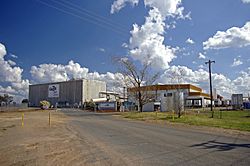
As of 2016, Cargill works in 70 countries around the world.
Africa
Algeria, Ivory Coast, Egypt, Ghana, Kenya, Morocco, Mozambique, Nigeria, South Africa, Uganda, Zambia, and Zimbabwe.
Asia and Pacific
China, India, Indonesia, Japan, Malaysia, Pakistan, Philippines, Singapore, South Korea, Sri Lanka, Taiwan, Thailand, and Vietnam.
India
Cargill started in India in 1987. Its food business, Cargill Foods India, processes and sells many types of cooking oils and fats. It also sells flour under the "Sampoorna" brand. Cargill India is one of the largest buyers and sellers of grains in India.
Pakistan
Cargill began working in Pakistan in 1984. Today, Cargill imports palm oil into Pakistan and sells it locally. It also buys raw cotton from Pakistan and sells it to other countries. Cargill deals in animal feed, farm products, and metals in Pakistan. In 2019, Cargill announced a $200 million investment to grow its business in Pakistan.
Europe
Austria, Belgium, Bulgaria, Denmark, Finland, France, Germany, Greece, Hungary, Ireland, Italy, Luxembourg, Netherlands, Norway, Poland, Portugal, Romania, Russian Federation, Slovakia, Spain, Sweden, Switzerland, Turkey, Ukraine, and the United Kingdom.
Latin America
Argentina, Bolivia, Brazil, Chile, Colombia, Costa Rica, Dominican Republic, Ecuador, Guatemala, Honduras, Nicaragua, Paraguay, Peru, Uruguay, and Venezuela.
Middle East
Jordan and United Arab Emirates.
North America
Cargill sells salt in the US under the Diamond Crystal brand.
Meat Processing Plants
Cargill has several large meat processing plants in the United States:
| Meat type | Plant location | Employees |
|---|---|---|
| Beef | Wyalusing, PA | 1,200 |
| Beef | Fresno, CA | 1,100 |
| Beef | Milwaukee, WI | 950 |
Sponsorships
Cargill has sponsored NASCAR race car driver Ricky Stenhouse Jr. in 2010 and 2015.
Concerns and Criticisms
Because Cargill is a private company, it does not have to share as much information as public companies. Over the years, Cargill has faced some criticisms.
Concerns about Child Labor
Cargill has faced lawsuits and reports about concerns regarding child labor on cocoa farms in places like Côte d'Ivoire. These reports suggest that children, sometimes trafficked from other countries, were working long hours without pay in difficult conditions. Cargill has stated that it is working to improve its systems to trace where its cocoa comes from to prevent such issues.
There were also past concerns about child labor in cotton production in Uzbekistan, where Cargill used to buy cotton. The company has stated it has not traded Uzbek cotton for several years.
Worker Safety Concerns
During the COVID-19 pandemic, there were concerns about worker safety at Cargill's meat processing plants. For example, a plant in High River, Canada, had many employees get sick with COVID-19. Workers' unions asked for the plant to be closed temporarily to protect employees.
Environmental Concerns
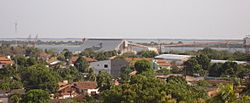
Cargill has been criticized for its impact on the environment, especially regarding deforestation.
- Soy: In Brazil, Cargill built a port for processing soya in the Amazon region. Environmental groups like Greenpeace said this led to more cutting down of the rainforest. Cargill and other soy companies later agreed to stop buying soybeans from newly deforested land for a period.
- Palm Oil: Cargill sells a lot of palm oil, which is used in many foods and products. Most palm oil comes from plantations in places like Sumatra and Borneo, where large areas of forest have been cleared to grow palm trees.
- Cocoa: Reports have also linked Cargill to buying cocoa grown illegally in protected forests in the Ivory Coast. This harms the habitats of animals like chimpanzees and elephants.
Cargill has also settled with the US government over issues related to air pollution from its plants.
Food Safety Recalls
Cargill has had to recall food products due to concerns about contamination.
- In 2007, Cargill recalled nearly 850,000 frozen beef patties because of possible E. coli contamination.
- In 2009, Cargill Australia's license to export meat was temporarily stopped after E. coli was found in its export containers.
- In 2011, Cargill recalled millions of pounds of ground turkey due to salmonella fears, which were linked to illnesses and one death.
- In 2012, Cargill recalled ground beef in Vermont due to salmonella concerns.
Other Concerns
Cargill has also faced allegations of land grabbing in Colombia, where it was accused of acquiring more land than legally allowed. There have also been past allegations of tax issues in Argentina.
Career Programs
Cargill offers programs and internships for students and recent graduates in Europe and the U.S.
|
See also
 In Spanish: Cargill para niños
In Spanish: Cargill para niños
 | May Edward Chinn |
 | Rebecca Cole |
 | Alexa Canady |
 | Dorothy Lavinia Brown |


